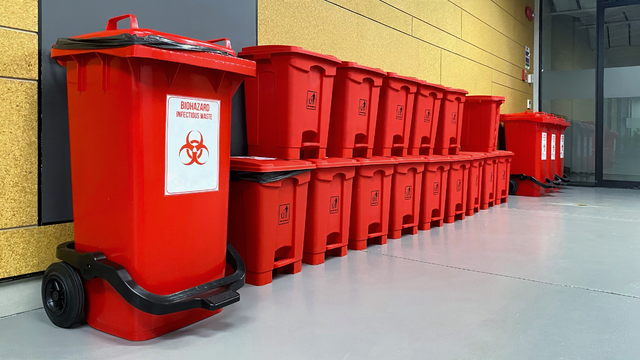How to dispose medical waste the right way is a critical consideration. In healthcare facilities, proper medical waste handling is not just a legal requirement; it’s a critical aspect of maintaining a safe environment for both employees and the public.
Specifically, the highest risk comes from exposure to puncture wounds from discarded sharps. The CDC estimates that there are at least as many as 385,000 sharps-related injuries every year, 40% of which occur after the sharps have been used on patients–which presents a significant risk for the spread of bloodborne pathogens.
However, the risks of medical waste aren’t limited to sharps. Improperly stored used bandages, human tissues, pharmaceuticals, cytotoxins (such as cancer drugs), and broken equipment (such as thermometers) can all present dangers to healthcare staff and patients.
So, what can your facility do to remain compliant with all applicable regulations and protect the people in your care? Basically, you need to foster a culture in which proactive measures are part of everyday routine.
Here are some tips for doing just that. Follow these best practices for handling medical waste effectively so you can promote workplace safety.
Incorporate These Medical Waste Disposal Methods in Your Work Culture
- Separating and Proper Labeling: One of the foundational principles of medical waste management is separating different types of waste at the point of generation (i.e., having designated containers for hazardous waste in treatment rooms). This ensures that potentially infectious materials are not mixed with regular trash. Proper labeling is essential for identifying the contents of waste containers accurately. Clear labeling helps prevent accidents and ensures that waste is treated appropriately during disposal.
- Compliance with Regulations: Adherence to local, state, and federal regulations governing medical waste disposal is non-negotiable. These regulations are in place to protect public health and the environment. It’s crucial for businesses to stay informed about any updates or changes to these regulations and adjust their medical waste disposal methods accordingly. Partnering with a reputable medical waste removal company will help ensure that your facility stays legally compliant.
- Use of Proper Containers: As mentioned in point 1 above, utilizing leak-proof, puncture-resistant containers designed specifically for medical waste is essential. These containers should be securely sealed to prevent spills or exposure to potentially hazardous materials. Additionally, selecting the appropriate size containers for the amount of waste generated can help optimize storage space and minimize the risk of overflow.
- Staff Training and Education: The proper training and education of staff members are paramount to creating a culture of safety in medical waste handling. Employees should receive comprehensive training on waste segregation, handling, and disposal procedures–as well as on the danger of bloodborne pathogens and other biohazards. Regular refresher courses and updates on best practices can help reinforce proper protocols and ensure everyone remains vigilant in their waste management efforts. Also, staff members should be trained to hold themselves and each other accountable for upholding safe practices.
- Wearing PPE for Safe Handling: Whether it’s disposing of sharps, contaminated linens, or chemical waste, implementing safe handling practices is crucial. This includes wearing appropriate personal protective equipment (PPE), such as gloves and goggles, when handling potentially infectious materials. Additionally, establishing protocols for cleaning spills or accidents promptly can help prevent contamination and exposure incidents.
- Partnering with Professional Medical Waste Removal Companies: Entrusting medical waste disposal to professional companies is an effective way of making sure that waste is handled and disposed of correctly. These companies have the expertise, resources, and equipment necessary to manage medical waste safely and efficiently. By outsourcing this vital aspect of waste management, businesses can focus on their core mission: providing the highest level of patient care.
Trust Superior with All Your Medical Waste Removal Needs
To summarize, creating a culture of safety in healthcare requires a proactive approach that combines waste separation, compliance with regulations, use of appropriate containers, staff training, implementation of safe handling practices, and partnering with reputable medical waste removal companies.
At Superior, we’re committed to helping you reach your safety goals with our full range of biowaste removal and disposal services. Our highly trained and experienced team is proud to serve medical facilities, tattoo parlors, funeral homes, and other businesses in
Michigan, Indiana, and Ohio. We understand the importance of focusing on how to dispose of medical waste correctly for the benefit of everyone. Contact us today if you’d like to schedule service.
